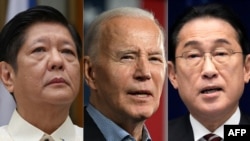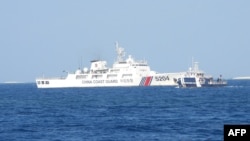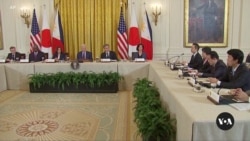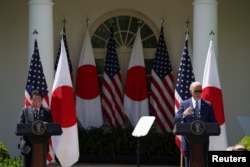U.S. President Joe Biden hosted Japanese Prime Minister Fumio Kishida and Philippines President Ferdinand Marcos Jr. at the White House on Thursday, aiming to send China a clear message that it must halt its aggressive behavior in the South China Sea.
"United States defense commitments to Japan and to the Philippines are ironclad," Biden said at the trilateral summit.
There has been rising tension between Manila and Beijing. In recent weeks, Chinese Coast Guard ships have taken provocative actions to block resupply missions for Philippine soldiers stationed on the Second Thomas Shoal, who guard Manila's sovereignty claims over the Spratly Islands.
"Facing the complex challenges of our time requires concerted efforts on everyone's part, a dedication to a common purpose and an unwavering commitment to the rules-based international order," Marcos said, couching his words in diplomatic terms often used to target Beijing.
"Multilayered cooperation between allies and like-minded countries is essential if we are to maintain and bolster a free and open international order based on the rule of law," Kishida reiterated.
Chinese intimidation known as "gray zone tactics" falls dangerously close to triggering a 1951 mutual defense treaty between Washington and Manila. Biden underscored U.S. commitment to the pact.
"Any attack on Philippine aircraft, vessels or armed forces in the South China Sea will invoke our mutual defense treaty," he said.
The leaders announced new deterrence measures, including on maritime defense, alongside investments in infrastructure projects in the Philippines and collaboration on global humanitarian assistance efforts.
This is Marcos' second time at the Biden White House, following his visit in May last year. He is seen as much more closely aligned with Washington than his predecessor, Rodrigo Duterte.
The Marcos government essentially doubled American access to Philippine bases earlier this year, announcing four new military bases on top of the five existing locations. Manila is also negotiating with Japan for a reciprocal access arrangement to allow Japanese forces on Philippine soil.
Similar situations
Kishida 's country faces similar Chinese gray zone tactics around disputed islands in the East China Sea, called Diaoyu in China and Senkaku in Japan. In a joint address to the U.S. Congress earlier Thursday, he warned of risks from the rise of China and pledged to do more to share defense responsibilities.
Key to the leaders' discussions Thursday is working toward a shared understanding of what constitutes gray zone attacks and the treaty's enforcement threshold.
"We continue to coordinate very closely the question of China's so-called gray zone tactics, its coercive tactics, and what the implications of those might be," a senior administration official said in response to VOA's question during a briefing Wednesday. The official spoke on condition of anonymity.
The U.S.-Philippines treaty extends to "armed attacks on Philippines Armed Forces, public vessels or aircraft," the official underscored. "That includes its Coast Guard, and that includes anywhere in the South China Sea."
Washington has been increasingly concerned about China's actions. While in the region last year, Vice President Kamala Harris stopped by Palawan island in the Philippines, just 330 kilometers east of the disputed Spratly Islands , in a rebuke to Beijing.
Blurring lines of attacks
China's gray zone tactics have blurred the lines of what are traditionally seen as armed attacks by using force that may not be intentionally lethal, such as military grade lasers, acoustic devices, high-pressure water cannons or simply ramming into ships, said Gregory Poling, director of the Southeast Asia Program and Asia Maritime Transparency Initiative at the Center for Strategic and International Studies.
"The problem is that these things are only nonlethal in a statistical sense," Poling told VOA. "But if you do it enough, you will kill somebody."
Manila and Washington would then need to determine whether to invoke mutual defense under the treaty, he added.
Both sides are realizing that "China has blurred the lines so much with its Coast Guard and militias," he added, saying, "We can't treat China the way we treat normal armed actors, that China intentionally hides its military force behind civilians, and that we need to be more flexible in our responses."
Discussions are ongoing under the Maritime Security Framework signed by the U.S. and the Philippines in 2022. Known also as "Guardian of the Sea," or "Bantay Dagat" in Tagalog, the agreement aims to improve regional maritime domain awareness and confront maritime challenges together.
Last year, the U.S. and Philippine secretaries of defense established guidelines reaffirming that "an armed attack in the Pacific, including anywhere in the South China Sea, on either of their public vessels, aircraft or armed forces — which includes their Coast Guards — would invoke mutual defense commitments under Articles IV and V of the 1951 U.S.-Philippines Mutual Defense Treaty."
However, there is no clear shared definition of gray zone tactics, which are challenging to incorporate into mutual defense treaties, said Shihoko Goto, director of the Indo-Pacific Program at the Wilson Center.
She told VOA there is greater focus on enhancing cyber defense and other nonkinetic capabilities for deterrence purposes. The summit will clarify established norms of conduct for protecting territorial boundaries, she added.
Dialogue with Beijing
Ahead of their trilateral summit with Marcos, Biden hosted Kishida for meetings and a state dinner Wednesday.
The pair insist on fostering dialogue with Beijing, even as the U.S. and Japan ramp up defense ties.
In their latest phone conversation in April, Biden said he discussed with Chinese President Xi Jinping the "best way to reduce the chances of miscalculation and misunderstanding."
The U.S. alliance with Japan is "purely defensive," Biden said during a joint news conference Wednesday. "It's not aimed at any one nation or a threat to the region."
Speaking through an interpreter Wednesday, Kishida said he and Biden "agreed that our two countries will continue to respond to challenges concerning China through close coordination."
They announced initiatives to enhance bilateral defense ties and maritime cooperation in the South China Sea, as well as joint air missile and defense systems between the U.S., Japan and Australia.
Beijing said it opposes "cobbling together exclusive groupings and stoking bloc confrontation in the region."
"Such practices - patching up small blocs, stirring up confrontation under the excuse of cooperation, upholding peace and order in name but flexing military muscle and stoking chaos in nature - do not meet the trend for peace and development and run counter to the regional countries' shared aspiration for stability and development," Liu Pengyu, a Chinese Embassy spokesperson in the U.S., said in a statement to VOA.
The U.S.-Japan-Philippines trilateral is the first gathering of its kind, part of Biden's strategy to stitch together existing bilateral alliances into these "minilaterals" to amplify U.S. influence in Asia. Last year, he hosted a similar meeting with Japan and South Korea to deal with the threat from North Korea.
















